Ditapis dengan
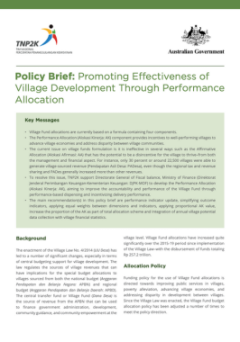
Policy Brief: Promoting Effectiveness of Village Development Through Performa…
The enactment of the Village Law No. 4/2014 (UU Desa) has led to a number of significant changes, especially in terms of central budgeting support for village development. The law regulates the sources of village revenues that can have implications for the special budget allocations to villages sourced from both the national budget (Anggaran Pendapatan dan Belanja Negara: APBN) and regional bud…
- Edisi
- 1
- ISBN/ISSN
- -
- Deskripsi Fisik
- PDF, 12 Halaman
- Judul Seri
- Policy Brief
- No. Panggil
- 352.54 ADJ.P
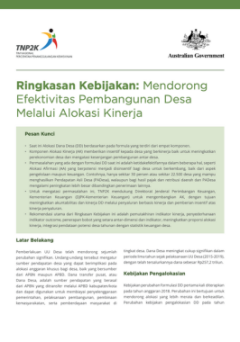
Ringkasan Kebijakan: Mendorong Efektivitas Pembangunan Desa Melalui Alokasi K…
Pemberlakuan UU Desa telah mendorong sejumlah perubahan signifikan. Undang-undang tersebut mengatur sumber pendapatan desa yang dapat berimplikasi pada alokasi anggaran khusus bagi desa, baik yang bersumber dari APBN maupun APBD. Dana transfer pusat, atau Dana Desa, adalah sumber pendapatan yang berasal dari APBN yang ditransfer melalui APBD kabupaten/kota dan dapat digunakan untuk membiayai pe…
- Edisi
- -
- ISBN/ISSN
- -
- Deskripsi Fisik
- PDF, 12 Halaman
- Judul Seri
- Policy Brief
- No. Panggil
- 352.54 ADJ.R
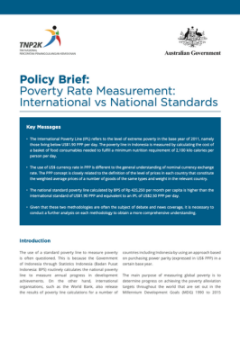
Policy Brief: Poverty Rate Measurement: International vs National Standards
The use of a standard poverty line to measure poverty is often questioned. This is because the Government of Indonesia through Statistics Indonesia (Badan Pusat Indonesia: BPS) routinely calculates the national poverty line to measure annual progress in development achievements. On the other hand, international organisations, such as the World Bank, also release the results of poverty line calc…
- Edisi
- 1
- ISBN/ISSN
- -
- Deskripsi Fisik
- PDF, 8 Halaman
- Judul Seri
- Policy Brief
- No. Panggil
- 362.5 HID.P
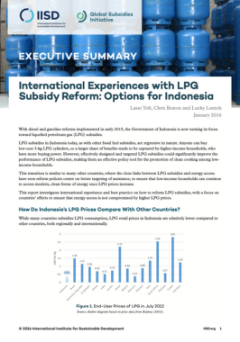
International Experiences with LPG Subsidy Reform: Options for Indonesia
With diesel and gasoline reforms implemented in early 2015, the Government of Indonesia is now turning its focus toward liquefied petroleum gas (LPG) subsidies. LPG subsidies in Indonesia today, as with other fossil fuel subsidies, are regressive in nature. Anyone can buy low-cost 3-kg LPG cylinders, so a larger share of benefits tends to be captured by higher-income households, who have more b…
- Edisi
- 1
- ISBN/ISSN
- -
- Deskripsi Fisik
- PDF, 4 Halaman
- Judul Seri
- Policy Brief
- No. Panggil
- 338.927 INT.I
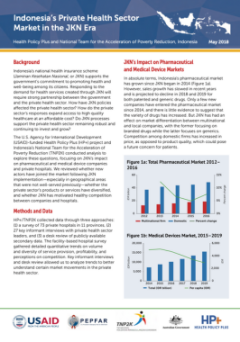
Indonesia’s Private Health Sector Market in the JKN Era
Indonesia’s national health insurance scheme (Jaminan Kesehatan Nasional, or JKN) supports the government’s commitment to promoting health and well-being among its citizens. Responding to the demand for health services created through JKN will require strong partnership between the government and the private health sector. How have JKN policies affected the private health sector? How do the…
- Edisi
- 1
- ISBN/ISSN
- -
- Deskripsi Fisik
- PDF, 2 Halaman
- Judul Seri
- Policy Brief
- No. Panggil
- 338.47 TNP. I
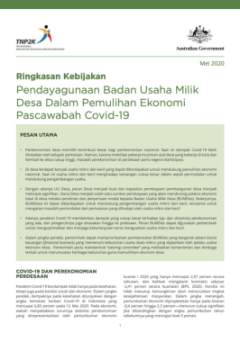
Ringkasan Kebijakan Pendayagunaan Badan Usaha Milik Desa Dalam Pemulihan Ekon…
Pandemi Covid-19 berdampak tidak hanya pada kesehatan, tetapi juga pada kondisi sosial dan ekonomi. Dalam jangka pendek, dampaknya pada kesehatan ditunjukkan dengan angka kematian korban Covid-19 di Indonesia yang mencapai 6,83 persen pada 12 Mei 2020. Pada ekonomi, wabah menyebabkan turunnya aktivitas perekonomian yang direpresentasikan oleh pertumbuhan ekonomi kuartal I 2020 yang hanya mencap…
- Edisi
- 1
- ISBN/ISSN
- -
- Deskripsi Fisik
- PDF, 8 Halaman
- Judul Seri
- Policy Brief
- No. Panggil
- 338.04 TNP.R
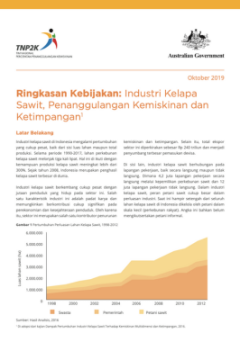
Ringkasan Kebijakan: Industri Kelapa Sawit, Penanggulangan Kemiskinan dan Ket…
Pandemi Covid-19 berdampak pada berbagai sektor, dari kesehatan hingga sosial-ekonomi, tak terkecuali ketenagakerjaan. Dalam jangka pendek, dampaknya pada kesehatan ditunjukkan dengan angka kematian korban di Indonesia yang mencapai 8,9 persen. Pada ekonomi, pandemi ini menyebabkan anjloknya aktivitas perekonomian domestik, yang tidak menutup kemungkinan akan menurunkan kesejahteraan masyarakat…
- Edisi
- -
- ISBN/ISSN
- -
- Deskripsi Fisik
- PDF, 8 Halaman
- Judul Seri
- Policy Brief
- No. Panggil
- 333.95 TNP.R
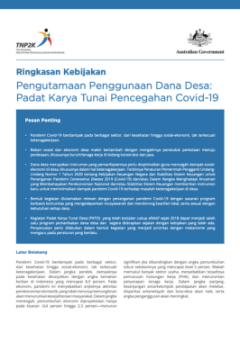
Ringkasan Kebijakan Pengutamaan Penggunaan Dana Desa: Padat Karya Tunai Pence…
Pandemi Covid-19 berdampak pada berbagai sektor, dari kesehatan hingga sosial-ekonomi, tak terkecuali ketenagakerjaan. Dalam jangka pendek, dampaknya pada kesehatan ditunjukkan dengan angka kematian korban di Indonesia yang mencapai 8,9 persen. Pada ekonomi, pandemi ini menyebabkan anjloknya aktivitas perekonomian domestik, yang tidak menutup kemungkinan akan menurunkan kesejahteraan masyarakat…
- Edisi
- 1
- ISBN/ISSN
- -
- Deskripsi Fisik
- PDF, 8 Halaman
- Judul Seri
- Policy Brief
- No. Panggil
- 352.54 ASM.R

Camera App a Catalyst for Teacher Performance Improvement in East Nusa Tenggara
It was almost 7.30 a.m. and the principal and teachers at Mboeng Elementary School (SDN Mboeng) in remote Kaju Wangi Village, Elar Subdistrict in Manggarai Timur, East Nusa Tenggara, took turns to take each other's photograph with a cellular phone. They were not about to update their social media's profile pictures. Instead, the photo session was part of KIAT Guru Pilot to improve education ser…
- Edisi
- 1
- ISBN/ISSN
- -
- Deskripsi Fisik
- PDF, 4 Halaman
- Judul Seri
- Policy Brief
- No. Panggil
- 371.3 DIA.C

Social Accountability in Action: Improving Teachers' Presence and Teachers' S…
That morning on the very last day of May 2017, a young woman was standing in a classroom that was transformed into a meeting hall. She held the microphone steady, her voice loud and clear, with no trace of nervousness or fear in front of an overwhelmingly male audience. She was reading the scores given to each teacher in the school for their service performance that month.
- Edisi
- -
- ISBN/ISSN
- -
- Deskripsi Fisik
- PDF, 6 Halaman
- Judul Seri
- Policy Brief
- No. Panggil
- 371.3 SUS.S
 Karya Umum
Karya Umum  Filsafat
Filsafat  Agama
Agama  Ilmu-ilmu Sosial
Ilmu-ilmu Sosial  Bahasa
Bahasa  Ilmu-ilmu Murni
Ilmu-ilmu Murni  Ilmu-ilmu Terapan
Ilmu-ilmu Terapan  Kesenian, Hiburan, dan Olahraga
Kesenian, Hiburan, dan Olahraga  Kesusastraan
Kesusastraan  Geografi dan Sejarah
Geografi dan Sejarah